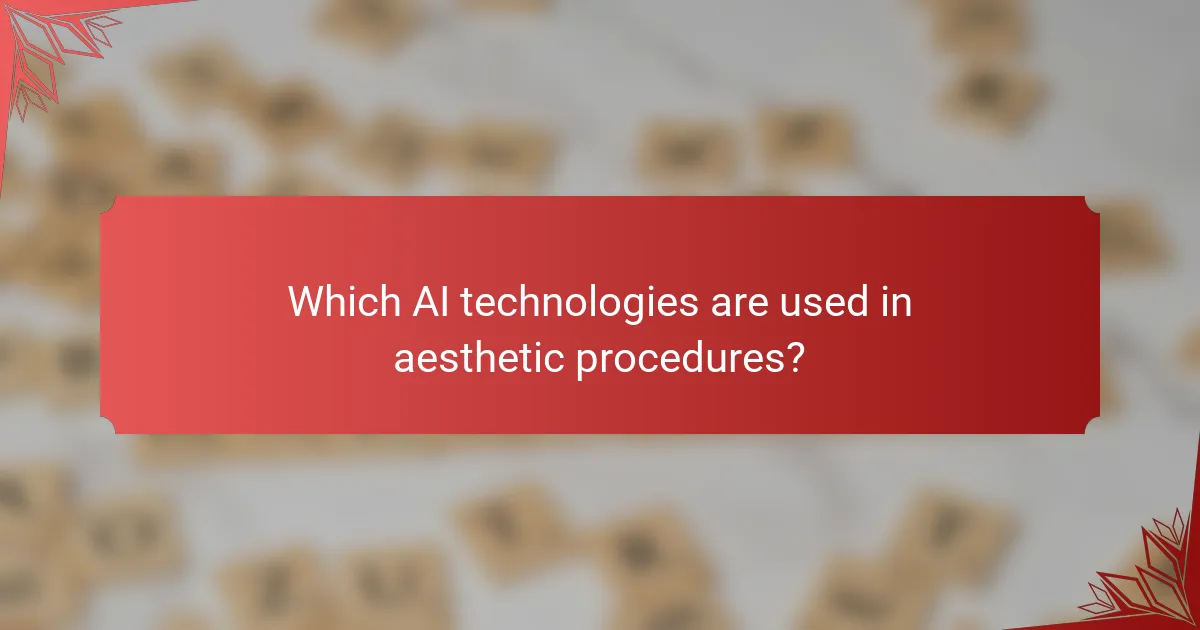AI is revolutionizing the field of aesthetics by introducing advanced technologies that enhance treatment methods and personalize client experiences. In South Africa, these innovations not only improve the predictability of outcomes but also lead to more effective and tailored solutions for clients. As a result, individuals benefit from enhanced treatment experiences, quicker results, and access to state-of-the-art technologies.

How is AI transforming aesthetics in South Africa?
AI is significantly transforming aesthetics in South Africa by enhancing treatment methods, personalizing client interactions, and improving predictability of outcomes. These advancements lead to more effective and tailored aesthetic solutions for clients across the country.
Enhanced treatment precision
AI technologies, such as machine learning algorithms, analyze vast amounts of data to refine aesthetic treatments. By assessing individual client characteristics and historical treatment outcomes, practitioners can achieve greater precision in procedures like laser treatments and injectables.
For instance, AI can help determine the optimal dosage of fillers or the ideal laser settings based on skin type and condition. This level of precision minimizes risks and enhances the overall effectiveness of aesthetic procedures.
Personalized client experiences
AI enables aesthetic practitioners to create highly personalized experiences for clients by analyzing preferences and previous interactions. This technology allows for tailored treatment plans that align closely with individual client goals and expectations.
In South Africa, clinics can use AI-driven tools to recommend specific treatments or products based on a client’s unique skin profile, lifestyle, and desired outcomes. This personalization fosters stronger client relationships and satisfaction.
Improved outcome predictability
AI enhances the predictability of treatment outcomes by utilizing predictive analytics to forecast results based on historical data. This capability allows practitioners to set realistic expectations for clients regarding the effectiveness of various aesthetic procedures.
For example, by analyzing past patient data, AI can help predict how a client’s skin will respond to a specific treatment, thereby reducing uncertainty. This improved predictability is crucial for client trust and decision-making in aesthetic choices.

What are the client benefits of AI in aesthetics?
Clients benefit from AI in aesthetics through enhanced treatment experiences, improved outcomes, and streamlined processes. These advantages lead to more personalized care, quicker results, and access to cutting-edge technologies.
Reduced treatment times
AI technologies can significantly shorten treatment durations by optimizing procedures and minimizing manual tasks. For instance, AI algorithms can analyze patient data quickly, allowing practitioners to make informed decisions faster and reduce wait times.
In many cases, AI-assisted treatments can be completed in single-digit minutes, compared to traditional methods that may take much longer. This efficiency not only enhances client satisfaction but also allows practitioners to serve more clients in a given timeframe.
Increased safety and efficacy
AI enhances safety and efficacy in aesthetic treatments by providing precise data analysis and predictive modeling. These technologies can identify potential risks and suggest tailored treatment plans, ensuring better outcomes for clients.
For example, AI can analyze a client’s skin type and medical history to recommend the most suitable procedures, reducing the likelihood of adverse effects. This personalized approach leads to higher satisfaction rates and improved overall results.
Access to advanced technologies
Clients gain access to advanced technologies through AI, which can enhance the quality and variety of aesthetic treatments available. AI-driven tools enable practitioners to utilize state-of-the-art equipment and techniques that may not be feasible without such support.
These technologies often include sophisticated imaging systems and real-time data analytics, which help in delivering more effective treatments. As a result, clients can experience innovative solutions that cater to their specific aesthetic goals, often leading to superior results compared to traditional methods.

Which AI technologies are used in aesthetic procedures?
AI technologies in aesthetic procedures include machine learning algorithms, computer vision applications, and robotic-assisted surgeries. These innovations enhance precision, improve patient outcomes, and streamline various processes in aesthetic treatments.
Machine learning algorithms
Machine learning algorithms analyze vast amounts of data to identify patterns and predict outcomes in aesthetic procedures. For example, they can help in customizing treatment plans based on individual patient characteristics, leading to more personalized care.
Practitioners can utilize these algorithms to assess patient feedback and treatment results, refining techniques over time. However, it’s crucial to ensure that the data used is diverse and representative to avoid biased outcomes.
Computer vision applications
Computer vision applications use image analysis to enhance aesthetic procedures by providing detailed insights into facial features and skin conditions. These technologies can assist in tasks such as skin assessment, wrinkle detection, and even predicting how a patient may respond to specific treatments.
For instance, computer vision can guide laser treatments by accurately targeting areas based on skin type and condition. Practitioners should ensure that the software is regularly updated to maintain accuracy and effectiveness.
Robotic-assisted surgeries
Robotic-assisted surgeries employ advanced robotics to perform aesthetic procedures with high precision and minimal invasiveness. These systems can enhance the surgeon’s capabilities, allowing for more intricate and delicate operations, such as facelifts or body contouring.
While these technologies can lead to quicker recovery times and reduced scarring, they require significant investment and training. It’s essential for clinics to weigh the benefits against costs and ensure that staff are adequately trained to use these systems effectively.

How to choose an AI-driven aesthetic clinic?
Choosing an AI-driven aesthetic clinic involves assessing their qualifications, technology, and client feedback. Focus on clinics that demonstrate expertise and positive client experiences to ensure effective and safe treatments.
Check for certifications and accreditations
Verify that the clinic holds relevant certifications and accreditations from recognized medical boards or aesthetic associations. This ensures that the clinic adheres to industry standards and regulations, which can vary by country.
In the United States, for example, look for clinics accredited by the American Board of Medical Specialties or similar organizations. In Europe, check for compliance with EU medical device regulations.
Evaluate technology offerings
Assess the types of AI technologies the clinic employs for treatments. Look for advanced systems that utilize machine learning for personalized treatment plans and outcomes.
For instance, clinics using AI for skin analysis can provide tailored recommendations based on individual skin types and conditions. Ensure the technology is up-to-date and backed by clinical research.
Read client testimonials
Client testimonials offer insight into the experiences of others who have undergone treatments at the clinic. Look for reviews that detail specific outcomes and the overall satisfaction of clients.
Consider checking platforms like Google Reviews or Trustpilot for unbiased feedback. A high number of positive reviews can indicate a reliable clinic, while consistent negative feedback may signal potential issues.

What are the costs associated with AI aesthetics treatments?
The costs of AI aesthetics treatments can vary significantly based on the procedure, location, and provider expertise. Generally, clients should expect to pay anywhere from a few hundred to several thousand dollars, depending on the complexity and technology used.
Price ranges for common procedures
Common AI aesthetics treatments include skin rejuvenation, body contouring, and facial enhancements. For instance, non-invasive skin treatments may cost between $200 and $800 per session, while more advanced procedures like AI-assisted liposuction can range from $3,000 to $10,000.
It’s essential to consider that multiple sessions may be required for optimal results, which can increase the overall cost. Clients should consult with providers to get a detailed breakdown of potential expenses.
Insurance coverage considerations
Most insurance plans do not cover AI aesthetics treatments, as they are often considered elective procedures. Clients should verify their specific policy details to understand any potential out-of-pocket costs.
Some providers may offer financing options or payment plans to help manage expenses. It’s advisable to discuss these options upfront to avoid unexpected financial burdens.
